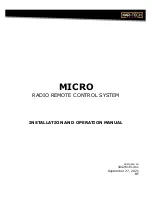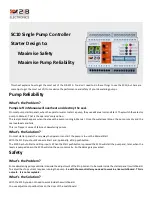
DEUTSCH
VICTOR
INSTALLATION AND USER’S MANUAL
Radio controlled accessories
ITALIANO
ENGLISH
VICTOR 2 868
T1
T2
HINWEISE
Dieses Installationshandbuch wendet sich ausschließlich an
professionell kompetentes Personal. Alle nicht ausdrücklich in dieser
Anleitung erwähnten Vorgänge sind nicht erlaubt.
ACHTUNG:
Der Lithium-Gleichstrom-Akku 3 V (CR2032) ist alle
zwei Jahre auszuwechseln, um eine optimale Senderleistung zu
gewährleisten. Der gebrauchte Akku ist zur Entsorgung in einen
spezifischen Sammelbehälter zu geben. Prüfen, dass das in der
Verpackung enthaltene Produkt einwandfrei und in gutem Zustand ist.
PRODUKTBESCHREIBUNG
Funksteuerung mit 66 Bit Rolling Codes Übertragung für einen
unangreifbaren Sicherheitsgrad. In der 2-Kanal-Ausführung
VICTOR 2 und in der 4-Kanal-Ausführung VICTOR 4 erhältlich.
TECHNISCHE EIGENSCHAFTEN DER
FUNKSTEUERUNGEN VICTOR 2 und VICTOR 4
Speisung mit Lithium-Gleichstrom-Akku: 3Vdc (CR 2032)
Betriebsfrequenz: 868MHz
Standard-Codierung:
66 bit Rolling Code
Max. Verbrauch:
<20mA
Betriebstemperatur: -20÷50°C
Abmessungen: 30x70x19mm
BETRIEB
Die Funksteuerung ist je nach Modell mit 2 oder 4 Tasten für die
Bedienung von 2 oder 4 verschiedenen Verbrauchern ausgestattet.
Zur Programmierung der Funksteuerung die Bedienungsanleitung
der Elektronikkarte nachschlagen (Kap. CODE TX).
AUSWECHSELN DES AKKUS
(VICTOR 2 868 - VICTOR 4 868)
Zur Auswechslung des Akkus, den oberen Deckel abnehmen und
den Akku herausnehmen. Den neuen Akku einsetzen.
• Die Lithium-Gleichstrombatterie 3 V (CR2032) ist alle zwei
Jahre auszuwechseln, um eine optimale Senderleistung zu
gewährleisten. Der gebrauchte Akku ist zur Entsorgung in
einen spezifischen Sammelbehälter zu geben.
EXPLOSIONSGEFAHR, FALLS DER AKKU MIT EINEM ANDEREN
AKKU VOM FALSCHEN TYP AUSGEWECHSELT WIRD. DIE
GEBRAUCHTEN AKKUS NACH GELTENDEN VORSCHRIFTEN
ENTSORGEN.
ENTSORGUNG
Einige Bestandteile des Produkts können rezykliert werden, während
andere wie z.B. die elektronischen Bestandteile nach den im
Installationsgebiet geltenden Vorschriften entsorgt werden müssen.
Einige Bestandteile könnten Schadstoffe enthalten und dürfen
nicht in der Umwelt zerstreut werden.
VICTOR 4 868
T1
T2
T3
T4
AVVERTENZE
Il presente manuale di installazione è rivolto esclusivamente a
personale professionalmente competente. Tutto quello che non
è espressamente previsto in queste istruzioni non è permesso.
ATTENZIONE:
La batteria al litio 3 Vdc (CR2032) deve essere
sostituita ogni due anni per garantire la portata ottimale del
trasmettitore. La batteria usata deve essere smaltita negli appositi
raccoglitori. Verificare che il prodotto all’interno dell’imballo sia
integro ed in buone condizioni.
DESCRIZIONE DEL PRODOTTO
Radiocomando con trasmissione di codici Rolling code a 66
bit. che garantisce un grado di sicurezza inviolabile. Esiste nelle
versioni VICTOR 2 a due canali e VICTOR 4 a quattro canali.
CARATTERISTICHE TECNICHE RADIOCOMANDI
VICTOR 2 e VICTOR 4
Alimentazione a pila litio:
3Vdc (CR 2032)
Frequenza di lavoro:
868MHz
Codifica standard:
66 bit Rolling Code
Consumo max.:
<20mA
Temperatura d’esercizio:
-20÷50°C
Dimensioni: 30x70x19mm
FUNZIONAMENTO
Il radiocomando, a seconda del modello, è dotato di 2 o 4 tasti
per la gestione di 2 o 4 utenze diverse. Per la programmazione
del radiocomando consultare il libretto d’istruzioni della scheda
elettronica (Capitolo CODE TX).
SOSTITUZIONE DELLA BATTERIA
(VICTOR 2 868 - VICTOR 4 868)
Per sostituire la batteria togliere la cover inferiore e sfilare la batteria.
Inserire quindi la batteria nuova. La batteria al litio 3 Vdc (CR2032)
deve essere sostituita ogni due anni per garantire la portata
ottimale del trasmettitore. La batteria usata deve essere smaltita negli
appositi raccoglitori.
ATTENZIONE: PERICOLO D’ESPLOSIONE SE LA BATTERIA
È SOSTITUITA CON ALTRA DI TIPO SCORRETTO.
ELIMINARE LE BATTERIE USATE SECONDO LE NORMATIVE
VIGENTI.
SMALTIMENTO
Alcuni componenti del prodotto possono essere riciclati mentre
altri come ad esempio i componenti elettronici devono essere
smaltiti secondo le normative vigenti nell’area di installazione.
Alcuni componenti potrebbero contenere sostanze inquinanti e
non devono essere dispersi nell’ambiente.
PRESCRIPTIONS
This installation manual is addressed exclusively to professionally
skilled personnel. Any operations that are not expressly set down
in these instructions are to be considered prohibited.
WARNING:
The 3 Vdc lithium battery (CR2032) must be changed
every two years to maintain transmission range at the optimal level.
The spent battery must be disposed of at an authorized battery
collection point.
Check that the product in the pack is intact and in good condition
PRODUCT DESCRIPTION
66 bit rolling code transmission remote control fob, offering
absolute security. Available in two channel version, VICTOR 2, and
in four channel version, VICTOR 4.
TECHNICAL SPECIFICATIONS OF VICTOR 2 and
VICTOR 4 REMOTE CONTROLS
Powered by lithium battery:
3Vdc (CR 2032)
Operating frequency:
868MHz
Standard codification:
66 bit Rolling Code
Max current draw:
<20mA
Working temperature:
-20÷50°C
Dimensions: 30x70x19mm
OPERATION
Depending on the model, the remote control fob has 2 or 4 buttons
to control 2 or 4 different users. To program the remote control fob
consult the electronic board handbook (TX CODE chapter).
CHANGING THE BATTERY
(VICTOR 2 868 - VICTOR 4 868)
To change the battery, remove the top cover and slide out the
old battery.
Fit the new battery.
• The 3 Vdc lithium battery (CR2032) must be changed every
two years to maintain optimal transmission range. The spent
battery must be disposed of at an authorized battery collection
point.
IMPORTANT: EXPLOSION HAZARD IF THE REPLACEMENT
BATTERY IS OF THE WRONG TYPE. DISCARD SPENT
BATTERIES IN COMPLIANCE WITH STATUTORY
LEGISLATION.
DISPOSAL
Several components of the product can be recycled while others,
such as electronic components, must be discarded in compliance
with the regulations in force in the place of installation.
Certain components may contain pollutant substances and must
not be released into the environment.




















